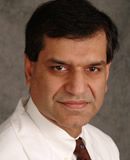Sleep Disorders Center
The human body functions differently during sleep than while awake. Disrupted sleep is quite common, and it can also disturb your daytime activities, safety and quality of life. Sleep disorders can cause --or be a symptom of-- other serious health problems, which is why it is important to evaluate them further.

Cabell Huntington Hospital's Sleep Lab is designed to help you and your doctor learn more about your sleep problems. Simple and painless testing can help evaluate you for sleep apnea, narcolepsy, insomnia, snoring, restless legs syndrome, problems from shift work and other sleep issues.
Through a sophisticated procedure called a polysomnogram, the sleep technician measures your bodily functions during sleep. Each study will vary depending on the individual, but some of the measurements taken include brain activity, heart rate, eye movements, muscle tension, leg movements, air flow, chest and abdominal breathing and blood oxygen levels.
The test results are analyzed by program director Imran Khawaja, MD, a board-certified pulmonologist and sleep disorders specialist with Marshall Pulmonology, to make a diagnosis and prescribe any necessary treatment.
Accreditation
The Sleep Disorders Center is fully accredited by the American Academy of Sleep Medicine (AASM). To receive a five-year accreditation, a sleep center must meet or exceed all standards for professional health care as designated by the AASM, including a detailed inspection of the center’s facility and staff, and an evaluation of testing procedures, patient contacts and physician training. Additionally, the facility’s goals must be clearly stated and include plans for positively affecting the quality of medical care in the community it serves.
In-Home Sleep Studies
Whenever possible, patients may undergo in-home sleep studies through CHH's Sleep Disorders Center. Dr. Khawaja and the sleep disorders technicians will use the information collected from your take-home sleep study device to identify what you are experiencing while sleeping and determine whether any treatment is needed.
“We are proud to be able to expand our services to meet the needs of the community,” said Dr. Khawaja, “Through our diagnostics and follow-up care, we have been able to help hundreds of people improve their health through better sleep.”
Our Location
Marshall Health Building300 Corporate Center Drive
Scott Depot, WV 25560
304.691.6938
